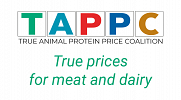Hearing 7 Nov: Climate Commissioner Hoekstra: carbon pricing (ETS) in all sectors
Wopke Hoekstra, who will have a hearing 7 November 9-12 h with the EU Parliament to become elected as the new Climate Commissioner, published his answers to written questions from the EU Parliament about his climate plans for the next 5 years. His position is very close to what the majority of the Environmental Committee of the EU Parliament also wants in terms of climate diplomacy. EU Agriculture is causing 31% of all greenhouse gas emissions in the EU, according to research of the EU Parliament.
TAPP Coalition is happy to see Wopke Hoekstra supports carbon pricing Emission Trading Schemes (ETS) on all sectors (including agri-food sectors). He also proposes new environmental taxation and he confirmed he will implement recommendations of the Strategic Dialogue on the Future of Agriculture. This report had different recommendations on 'true pricing' of food products, fiscal incentives and Agri-ETS (impact assements). TAPP Coalition was invited by Wopke Hoeksta's cabinet and the cabinet of Agriculture Commissioner Hansen after sending a letter about an Agri-ETS and the Strategic Dialogue on the Future of Farming. TAPP Coalition proposes to exclude organic food/farmers from a new Agri ETS to support the goals for organic farming in the EU (to make organic food more affordable) and prevent any potential negative impact of Agri ETS on the sector, animal welfare and biodiversity.
GHG-emission pricing ETS for all sectors including landsector
On the topic of Emission Trading Scheme ETS, a cap and trade system, Hoekstra wrote all sectors, including the agri-food sector, need to be part of an ETS system, which was advised by the SEU Climate Board SABCC and other scientific based reports (eg World Bank):
"We need to invest in people, skills and the just transition and use climate policy to increase people’s well-being. Carbon pricing, via the ETS at EU level, is essential for cost-effective mitigation action and as a financing tool generating revenues for innovation, and to support measures benefitting the most vulnerable groups. In short, well-designed carbon pricing addresses both environmental, economic and social objectives. This will need to be flanked bysectoral measures, for instance in energy, transport or the land sector, and by a wider enabling policy framework,putting the sectoral needs of the transition central. The Commission bases its climate policy proposals and recommendations on thorough impact assessments in full consistency with its Better Regulation requirements. The advice of the Scientific Advisory Board on Climate Change is also taken into due account. Let me underline that these analyses make use of the most advanced economic analysis tools, which are also extensively used in the scientific literature and allow to fully cover the EU economy and its different sectors, as illustrated recently in the 2040 Climate Target Impact Assessment that the Commission published in February. This ensures that the Commission’s policy decisions on the role of the different sectors is, and will remain, informed by in-depth analysis grounded on a scientific approach, allowing for the design of policy packages that can deliver our objectives in a cost-efficient, fair and effective manner. In this endeavour I will remain open to a frank and transparent dialogue with all sectors to achieve our climate objectives in a balanced and cost-effective way.
Carbon Removals and ETS
On carbon removals, Hoekstra said: "the Commission will develop further policy and support mechanisms for scaling up of removals. This includes, among other things, an assessment of how removals with permanent storage could be accounted for under the Emissions Trading System and an assessment of overall objectives for removals in the context of the 2040 climate target". Hoekstra also wrote: "We will assess the best set of policies to provide incentives for both emissions reductions and carbon removals in the 2040 policy framework. An efficient carbon removals policy will be necessary to achieve a 90% net reduction in greenhouse gas emissions by 2040 and climate neutrality by 2050, as clearly highlighted in the Communication and accompanying impact assessment. I will make sure this policy is in place at the end of my mandate, while supporting, together with public and private partners, the early stage development of what should become over time a single European market for carbon removals. Industries, farmers or foresters providing the service of carbon removals should be rewarded while efforts in reducing emissions are not hampered".
TAPP Coalition concludes from this announcements that the agriculture sector in the vision of Hoekstra will become part of an ETS system, also for carbon removals. TAPP Coalition supports a standalone Agri-ETS, not connected to the industry ETS1 and transport/building ETS2. Otherwise, financial powerfull industries can buy out farmers from the market. The Agri-ETS 3 should also be separte from the European market for carbon removals. This is because carbon removals in food systems like carbon farming or by planting trees, to store carbon in the soils and in trees, is reversable. If farmers start deep ploughing in a later moment, or cut trees.
Environmental taxation
Wopke Hoekstra wrote: "I strongly believe that taxation is a key pricing instrument for driving climate goals. It has the potential to act as a catalyst for transformation, encouraging individuals and businesses to make more sustainable choices. However, the EU's environmental taxes are currently not harmonised, leading to a disarray of environmental and carbon taxation across Member States. This lack of coherence creates confusion and undermines the effectiveness of our climate policies. If confirmed as Commissioner for taxation and climate, I will be well-placed to make the most of the available tools and ensure the alignment between taxation policy and climate goals. To address this issue, I aim to engage in discussions with Member States towards a more balanced and coherent approach to environmental taxation. By working together, we can create a more level playing field and ensure that all Member States are aligned with our common climate and environmental policies. There is, for instance, room to enhance the use of environmental taxes to ensure the application of the Polluter Pays principle".
Hoekstra also wrote: "There is also scope to better leverage tax policy tools to tackle biodiversity loss and environmental degradation. The relative lack of progress with environmental taxation implies that consumers currently purchase too many polluting products and fail to switch to cleaner alternatives, such as recycled products, where it would be economically efficient and socially desirable. Similarly, clean businesses may fail to attract financing, while polluting businesses benefit from inefficiently low capital costs. The Commission services are working on identifying policy gaps. Therefore, it is too early to commit to specific policy instruments – be it soft-law measures such as recommendations or more ambitious measures, for instance introducing EU minima for environmental taxes other than energy taxes – but I can commit to a more decisive push for market-based measures in tackling environmental issues more comprehensively.
TAPP Coalition hopes Hoekstra will choose the more ambitious measures like introducing EU minima for environmental taxes. In 2022, total environmental tax revenue in the EU amounted to €317.2 billion, representing only 2.0% of EU GDP and 4.8% of total EU government revenue from taxes and social contributions. Taxes on energy in the EU accounted for more than three-quarters of the total revenues from environmental taxes (77% of the total) in 2022, well ahead of taxes on transport (19%) and pollution and resources (4%). A new EU minimum for environmental taxes could be for instance 7% of EU GDP by 2030, including 2% from pollution and resources and 1% from agriculture related pollution. TAPP Coalition published a report 'Sustainability charge on meat' showing pollution taxes on meat (GHG emissions, nitrogen, particulate matter) will reduce GHG emissions in the EU with 3% (120 Mton CO2 eq) and result in 32 billion euro per year that could be used to support farmers to reduce emissions and support consumers to reduce prices/taxes of sustainable food products like recommended by the Strategic Dialogue on the Future of Agriculture. This will lead to reduced prices for healthy food. Another organisation Ex'tax also promotes the increased use of environmental taxes, also enabling reductions of taxes on labor and encouraging circular economies to make recycling more attractive.
EU's climate diplomacy on ETS promotion in the world
The main objective of the EU’s climate diplomacy is to stimulate ambition and investment. We want to encourage our partner countries to define and achieve ambitious climate targets aligned with the goals of the Paris Agreement. The EU’s own successful emission reduction efforts mean that nowadays we only account for 6% of global emissions. Addressing the other 94% for the protection of our climate and planet is crucial. The upcoming update of countries’ Nationally Determined Contributions will be key in delivering on the COP28 UAAE Consensus and the Global Stocktake agreed in Dubai. For COP30 in Brazil and beyond, with the help of other Members of College, I will contribute to setting our global climate and energy vision. Concretely, I will promote carbon pricing as an essential element of a broader policy mix to achieve the goals of the Paris Agreement. It can create market conditions that enhance the business case for decarbonisation and accelerate the transition while generating revenues that can be reinvested in decarbonisation and the transition. Global carbon pricing will also help create a level playing field for businesses. The EU Emissions Trading System is a model for many aspiring carbon pricing systems. Since its launch in 2005, it has contributed to reducing greenhouse gas emissions by over 47% in the covered sectors. We want to share our experience and knowledge to encourage more countries to implement effective carbon pricing policies. Therefore, I want to enhance our engagement to support partners in establishing robust carbon pricing and markets as part of a broader climate and energy policy mix, building on existing cooperation. The recently established Task Force on international carbon pricing and carbon markets diplomacy that I have initiated has the potential to be a game-changer for the 94% of emissions mentioned earlier. Like for the EU, pricing carbon might be the most impactful measure they can take. The interest is there, as a growing number of countries, including most G20 countries are implementing or exploring carbon pricing policies, also in response to the Carbon Border Adjustment Mechanism. To date, 75 carbon pricing instruments covering 24% of global emissions are already in place. However, these policies are often translated into low ambition, low prices and limited coverage while some big emitters are still lagging behind."
TAPP Coalition hopes the EU Commission will also lead the global debate on pricing high-emission food products in high and middle income countries, like urged by the World Bank in its report 'Recipe for a Liveable Planet'.
The EU Commission published documents and recordings of five technical workshop on a new EU Agri-Food Emission Trading Scheme on this public website: https://climate.ec.europa.eu/eu-action/carbon-removals-and-carbon-farming_en#:~:text=On%2010%20April%202024,%20the%20European%20Parliament%20adopted%20the%20provisional
Scroll down to: 'Carbon farming in the agri-food value chain' and see the different technical workshops and strategic dialogue meetings.



